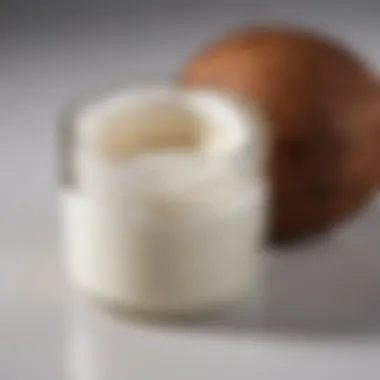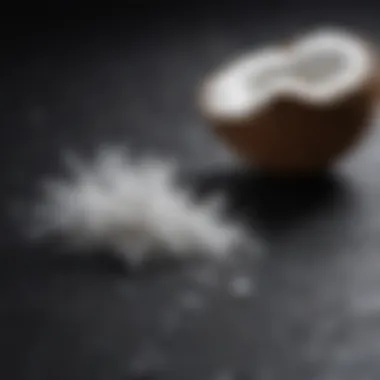Exploring the Benefits of Coconut Oil for Dandruff


Intro
Coconut oil has made quite a splash in the natural health and beauty scene lately. Many people swear by it for a multitude of purposes, from cooking to skincare to hair care. Among its many supposed benefits, a common topic that piques interest is its potential role in managing dandruff. As we navigate through the world of remedies for this pesky scalp issue, we'll delve into how coconut oil could be a natural ally in our fight against those flakes.
Understanding dandruff is essential before we jump into solutions. It’s not merely an annoyance but can also be a point of concern for many. The discomfort and embarrassment leading from visible flakes can often take a toll on one's confidence. So, why is coconut oil creating the buzz? Let's take an insightful journey into its properties, how it interacts with hair and scalp, and whether it really holds up under scrutiny when it comes to tackling dandruff.
Prologue to Dandruff
Dandruff, that pesky scalp issue, can be more than just an annoyance. It often affects self-esteem and might even lead to social discomfort. This article delves deeper into the intricacies of dandruff, particularly how coconut oil may provide a natural solution. \n\n### Understanding Dandruff
Dandruff is a common condition characterized by dry or oily flakes of skin that show up on the scalp and often the shoulders. Most folks might shrug this off as an everyday nuisance. But, it’s essential to dig a bit deeper. \n\nThe underlying causes of dandruff can range from seborrheic dermatitis and dry skin to fungal overgrowth or even certain food sensitivities. This multifaceted nature makes it critical to understand one's specific type of dandruff. People might describe it like trying to find a needle in a haystack—easy to see but tough to pinpoint what’s really going on underneath. \n\n### Prevalence and Impact
Dandruff doesn’t discriminate; it can affect anyone from young students to seasoned professionals. Studies suggest that nearly half of the global population has grappled with it at some point in their lives. That’s a whopping statistic!\n
The implications go beyond the physical irritation. There’s a psychological impact, particularly among women, as well. Many of them feel self-conscious about the visible flakes, especially if they wear darker clothing. Social interactions can become tension-filled when one worries about looking less than polished, making this seemingly simple problem much more than just a minor inconvenience.
\nUnderstanding the prevalence and significance of dandruff lays the groundwork for exploring how coconut oil could possibly help manage it. It's worth noting that not all solutions are created equal, and every person's scalp health is unique. Reading each section carefully will help unravel the effectiveness of coconut oil in the larger picture of dandruff management.
"Dandruff affects nearly half of the global population at some point, proving it’s not just a personal problem but a widespread one."
So as we go along, be prepared to uncover layers of information that may just lead you to a path to healthier scalp and hair.
The Role of Coconut Oil
Coconut oil has increasingly become a spotlight ingredient in discussions about hair care, particularly when it comes to managing dandruff. Much of the interest arises from its natural properties that promise to address some of the root causes of this common scalp condition. Understanding how coconut oil works can arm individuals with the knowledge needed to make informed choices about their hair care routines. This section delves into the specific components of coconut oil, as well as its beneficial effects related to dandruff and overall scalp health.
Composition of Coconut Oil
Coconut oil is not just any ordinary oil; it boasts a unique blend of fatty acids and nutrients. The main players include lauric acid, capric acid, and caprylic acid. These fatty acids come from the flesh of matured coconuts and are what make coconut oil exceptional for hair health.
Lauric acid constitutes about 50 percent of coconut oil's composition. It’s renowned for its rich antimicrobial properties that can inhibit the growth of bacteria and fungi. Capric acid and caprylic acid enhance these properties, making coconut oil particularly effective against the yeast-like fungus, Malassezia, which is often associated with dandruff. When applied to the scalp, this potent mix works diligently to combat potential dandruff triggers, creating a healthier environment for hair to flourish.
Antifungal Properties
The antifungal properties of coconut oil can’t be overstated. Research indicates that lauric acid can penetrate the cell walls of certain fungi, leading to cell rupture and death. This is critical in the fight against dandruff, as the itchy and flaking symptoms often arise due to an overgrowth of fungi.
In fact, in many cases, conditions like seborrheic dermatitis are linked to Malassezia. Incorporating coconut oil into a hair care routine may significantly diminish the population of this unwanted fungus. A systematic approach could involve applying coconut oil regularly and monitoring improvement—many people report positive outcomes relatively quickly.
"Coconut oil’s ability to fight fungi can provide an effective layer of defense against dandruff, promoting a healthier scalp."
Moisturizing Effects
One of the standout qualities of coconut oil is its excellent moisturizing capability. Dry scalp can worsen dandruff, leading to an ongoing cycle of irritation and flaking. The oil's rich composition penetrates deeply, helping to maintain and restore moisture levels to the scalp and hair.
This is especially important in environments that can sap moisture—cold winters or dry climates, for example. Regularly integrating coconut oil into hair care practices enables the scalp to maintain its hydration levels, ultimately reducing the itchiness and buildup often associated with dandruff. As an added bonus, moisturized hair appears shinier and healthier, enhancing overall aesthetics.
In summary, the role of coconut oil in handling dandruff emerges from its multifaceted properties. Its composition, antifungal action, and moisturizing effects converge to create a natural remedy worth considering. By embracing coconut oil, individuals can approach their scalp health from a holistic standpoint, potentially dispelling the nemesis of dandruff for good.


Coconut Oil and Dandruff Management
Dandruff can be more than just a bothersome scalp condition. It’s often a sign of underlying issues that, when left unchecked, might lead to more severe health challenges. Using coconut oil in this context is not merely about its appearance on store shelves; it’s about integrating it into your hair care practices for more effective management. Through this section, we’ll dig into the specific benefits coconut oil brings to scalp health and how one can weave it seamlessly into their daily routine.
Effects on Scalp Health
Coconut oil has long been a staple in various cultures, particularly in tropical regions where coconuts grow abundantly. Its application for scalp health ties back to its natural properties. First off, coconut oil contains lauric acid that possesses impressive antifungal attributes, which can directly address one of the major culprits of dandruff: the fungus Malassezia.
Moreover, the oil acts as a barrier against dryness. A healthy scalp is often a hydrated scalp, and coconut oil can help in retaining moisture to minimize flakes and irritation. The richness of the oil forms a protective layer, which can prevent the scalp from becoming overly dry, especially during harsh weather conditions.
Additionally, coconut oil also exhibits anti-inflammatory characteristics. This means that regular application may reduce irritation and redness that sometimes coincide with dandruff. In essence, utilizing this oil could make the scalp feel more comfortable, leading to fewer instances of scratching – and therefore minimizing potential secondary infections. An important aspect to consider:
"A well-nourished scalp can significantly influence hair health. If the foundation isn’t right, the hair can suffer."
Integrating Coconut Oil into Hair Care
Incorporating coconut oil into your hair care regimen isn’t a Herculean task. In fact, the process can be simple and enjoyable. Here are some practical steps you might consider:
- Pre-wash Treatment: Apply coconut oil to your scalp and hair a few hours before shampooing. This acts as a shield against harsh shampoo ingredients and helps retain moisture.
- Leave-In Conditioner: A few drops can be warmed between your palms and applied to the ends of the hair as a leave-in conditioner. This not only helps combat dryness but also adds shine.
- Scalp Massage: Take a moment to give your scalp a gentle massage with coconut oil. This not only promotes blood circulation, which is crucial for hair health, but can also enhance the absorption of the oil.
- Masking: Mix coconut oil with essential oils such as tea tree oil for added antifungal benefits, and let it sit on your scalp for about 30 minutes before rinsing.
While using coconut oil, remember that a little goes a long way; excessive application can lead to greasiness and attract dirt. So keep the motto "less is often more" in mind. It can be beneficial to experiment with consistent use, noting how your scalp reacts over time, and adjusting frequency as needed.
Scientific Evidence and Studies
Understanding the scientific evidence surrounding coconut oil's effectiveness for managing dandruff is crucial for those seeking a reliable solution. A wealth of research can illuminate how coconut oil interacts with scalp health, its capacity to mitigate dandruff, and its standing against other remedies. Collectively, these studies provide a solid foundation for its benefits, as well as potential limitations.
Review of Existing Research
Coconut oil has not just become a trend; it’s backed by a number of studies. For instance, a significant body of research suggests that coconut oil's fatty acids, such as lauric acid, have antimicrobial properties. These properties can potentially reduce the presence of Malassezia, a fungus commonly associated with dandruff. In a study published in the Journal of Dermatological Treatment, participants who applied coconut oil to their scalp reported a noticeable reduction in flaking and itchiness over time.
Nevertheless, while many studies show positive outcomes, it is essential to remain discerning. Not all research is created equal. Some studies emphasize the need for further investigation, pointing out the variability in individual responses to coconut oil treatments. Cultural factors, different hair types, and even diet can play a role in how well coconut oil works for an individual.
Comparative Studies with Other Remedies
Comparative studies have also been conducted to gauge how coconut oil matches up against conventional dandruff treatments. For example, a study involved participants using coconut oil alongside popular over-the-counter antifungal shampoos. While both solutions were found effective, coconut oil resulted in fewer side effects, particularly for people with sensitive skin.
Moreover, a review comparing coconut oil to tea tree oil highlighted the strengths of both. Tea tree oil is often touted for its antifungal qualities, yet coconut oil’s moisturizing effects can be a game-changer for those with dry, irritated skin. A balance between the two could yield remarkable results, creating a customizable approach to dandruff management.
"While scientific research highlights the benefits of coconut oil, personal experiences can vary widely; what works wonders for one may not suit another's scalp condition."
As research continues to unfold, it is hopeful that coconut oil can solidify its position as not only a popular natural remedy but a scientifically supported one as well.


The studies discussed not only provide insight into the effectiveness of coconut oil but also serve as a reminder that improved scalp health often requires a tailored approach, taking into account individual needs and preferences.
Alternative Remedies for Dandruff
Dandruff can be more than just a nuisance; it can also affect confidence and comfort. While coconut oil has gained traction as a potential remedy, exploring alternative options can provide a broader understanding of what one can do to combat this issue. Many people seek natural solutions due to concerns about harsh chemicals often found in traditional treatments. Additionally, some might find that certain methods work better for them based on their unique scalp and skin types. It's essential to consider each alternative carefully, weighing the benefits as well as potential drawbacks to find a suitable strategy for effective dandruff management.
Natural Alternatives
Natural remedies for dandruff have been used across cultures, often passed down through generations. These remedies can often deliver results without the side effects associated with synthetic treatments. A few notable natural alternatives include:
- Tea Tree Oil: This essential oil is recognized for its antifungal properties, making it a popular choice. Adding a few drops to a carrier oil before applying it to the scalp might help ease dandruff symptoms.
- Apple Cider Vinegar: Known for its acidity, apple cider vinegar can balance the pH of the scalp. Mixing it with water and using it as a rinse may help reduce flakes and soothe irritation.
- Aloe Vera: Aloe Vera gel is well-known for its soothing qualities. It can hydrate the scalp while also providing antimicrobial benefits. Regular application could potentially alleviate dryness associated with dandruff.
These remedies tend to be gentle on the skin while promoting a healthier scalp environment. However, one should always conduct patch tests to ensure there is no allergic reaction before full application.
Over-the-Counter Treatments
For those who prefer a more straightforward approach, over-the-counter treatments can be effective in managing dandruff. These products are typically formulated with specific ingredients known to address the root causes of dandruff, such as malassezia fungus or dry skin. Common ingredients to look for include:
- Zinc Pyrithione: A common antifungal and antibacterial agent, zinc pyrithione can reduce the fungi that contribute to dandruff.
- Selenium Sulfide: This ingredient helps slow down the turnover of skin cells, which could assist in controlling flakiness.
- Ketoconazole: A prescription antifungal, this is also available in some over-the-counter shampoos and is effective in targeting specific types of dandruff.
When opting for these treatments, reading the labels and following application directions closely is critical. It may take time to find the product that works best for you, as results can vary from person to person.
Practical Tips for Use of Coconut Oil
When it comes to incorporating coconut oil into your hair care routine, knowing how to use it effectively can make all the difference. It's not just about slapping on a bit of oil; rather, it's about understanding the best practices that can maximize its benefits. In this section, we'll dive into two key aspects: application techniques and the frequency and duration of use.
Application Techniques
The way you apply coconut oil can influence its effectiveness significantly. Below are some helpful techniques to consider:
- Warm it Up: Before applying, try warming up the coconut oil slightly. This can thin it out and make it easier to spread. Just make sure it's comfortable to the touch—hot oil can cause burns.
- Section Your Hair: To ensure even distribution, comb through your hair and section it into manageable parts. Apply the oil section by section, focusing on the scalp and the ends of your hair, where it tends to be drier.
- Gentle Massage: When applying, use your fingertips to gently massage the oil into your scalp. This not only helps the oil penetrate better but also stimulates blood circulation, which is beneficial for hair health.
- Use a Comb: A fine-tooth comb can help distribute the oil evenly and ensure that all strands are coated. This aids in detangling and can help avoid breakage.
- Don’t Overdo It: Remember, a little goes a long way. Applying too much coconut oil can lead to greasiness and scalp build-up. Just enough to coat your hair and scalp lightly is ideal.
Frequency and Duration of Use
Finding the right balance in how often to use coconut oil is key. Here are practical suggestions:
- Start Slow: If you're new to using coconut oil for dandruff, begin with once a week. This allows you to observe how your scalp reacts before increasing the frequency.
- Assess Your Scalp Condition: Factors such as climate, scalp condition, and hair type can dictate how often you should apply coconut oil. For instance, if you live in a dry climate, you may benefit from using it twice a week, while those in humid areas might stick to weekly applications.
- Duration of Treatments: Leave the coconut oil on your scalp and hair for a minimum of 30 minutes for basic treatments. For more intensive hydration, consider wearing it overnight. Just protect your bedding with a towel or a shower cap for extra safety.
- Follow Up with Shampoo: After allowing the oil to sit, ensure you wash it out properly. Use a gentle shampoo, as harsh cleansers can strip your hair of natural oils.
The right techniques and frequency in using coconut oil can determine its effectiveness in managing dandruff and enhancing scalp health.


By making these application techniques and usage suggestions a part of your routine, you can harness the full potential of coconut oil in promoting a healthier scalp and addressing dandruff concerns. Being mindful about its application not only aids in effectiveness but also helps in maintaining the balance of moisture in your hair.
Common Concerns and Misconceptions
Understanding the common concerns and misconceptions surrounding coconut oil and its effectiveness in combating dandruff is essential for anyone considering its use. Dandruff, while not a serious health issue, can be a source of discomfort and embarrassment for many. Therefore, demystifying some of the worries related to coconut oil can help users make informed choices about their hair care routine.
Oiliness and Scalp Build-Up
One of the primary worries for individuals considering coconut oil is the potential for excessive oiliness or scalp build-up. Many people fear that applying oil, especially a heavier one like coconut oil, might exacerbate their dandruff situation by creating an overly greasy scalp.
However, this concern often stems from misunderstandings about the properties of coconut oil. While it is indeed an oil, it possesses unique properties that can help balance moisture in the scalp, rather than overwhelm it. The key lies in how it is applied.
- Use Moderation: Instead of slathering on a hefty amount, using a small quantity can provide hydration without the greasiness.
- Frequency: Applying coconut oil once or twice a week might be beneficial. This frequency allows for moisture retention while giving the scalp room to breathe.
- Application Techniques: Rather than applying directly to the scalp, consider mixing coconut oil with other lighter oils or natural ingredients to create a blend that provides the nourishing benefits without the heavy feeling.
By addressing these aspects, users can enjoy the benefits of coconut oil while minimizing any concerns about oily residues or build-up.
Allergic Reactions
Another concern that surfaces with coconut oil use is the possibility of allergic reactions. Not all oils are created equal, and everybody's skin behaves differently. While coconut oil is generally touted for its skin-friendly properties, some individuals may experience sensitivity.
It's important to note that true allergies to coconut oil are quite rare. However, contact dermatitis, a less severe reaction, can occur. Signs may include redness, itching, or irritation. Here are a few points to keep in mind:
- Patch Test: Before fully incorporating coconut oil into your routine, do a small patch test on the inner wrist or elbow. Wait 24 hours to see if any irritation develops.
- Choose Virgin or Pure Oils: Opt for high-quality, virgin coconut oil to reduce the risk of contaminants that can exacerbate sensitivity.
- Listen to Your Skin: If it doesn’t sit well with your scalp, it’s wise to discontinue use and consult a dermatologist if needed.
To sum it up, while allergic reactions are a legitimate concern, they can be minimized with proper forethought and care. Awareness is key, as is understanding one’s own skin’s needs and tolerances.
"Knowledge is power. Understanding common misconceptions around coconut oil can empower individuals to make informed choices about their dandruff treatment."
Incorporating coconut oil can indeed offer benefits, but it's important to navigate these concerns with a level-headed approach. By taking precautions regarding oiliness and the potential for allergic reactions, users can fully enjoy what coconut oil can do for their scalp and hair in managing dandruff.
End and Final Thoughts
In wrapping up our exploration of coconut oil and its potential role in combating dandruff, we find ourselves at an intersection of nature's rich offerings and modern hair care needs. The persistent challenge of dandruff often leaves individuals searching high and low for effective solutions. Here, we have illuminated how coconut oil—an age-old remedy—is gaining traction in contemporary discussions around dandruff management.
Summary of Key Points
Throughout this article, we discussed the multifaceted benefits of coconut oil for scalp health. Specifically, these points were highlighted:
- Composition and Moisturizing Effects: Coconut oil is rich in fatty acids, providing not only moisture but also a protective barrier that benefits the scalp.
- Antifungal Properties: Its natural antifungal qualities can help tackle the root causes of some dandruff instances, particularly those linked to fungal overgrowth.
- Research and Evidence: Various scientific studies hint at a positive correlation between coconut oil use and scalp health. Such research serves to bolster consumers’ confidence in natural remedies over conventional treatments.
- Practical Application: We outlined practical tips for effective integration of coconut oil into your existing hair care regimen, allowing for better management of dryness and flakiness.
Future Considerations for Hair Care
Looking ahead, the topic of hair care continues to evolve, especially as more individuals gravitate towards natural and holistic solutions. Here are some considerations for the future:
- Research on Coconut Oil: There's a need for further studies exploring the long-term benefits and potential side effects of coconut oil, ensuring that its usage is both safe and effective for a diverse audience.
- Personalization in Hair Care: Each person's scalp and hair type can react differently to various products, including coconut oil. Future hair care practices may focus on personalized treatment plans that cater to individual needs based on hair texture, scalp condition, and even lifestyle.
- Combination with Other Remedies: Combining coconut oil with other natural ingredients could lead to more robust treatment options. Ingredients such as tea tree oil or aloe vera may enhance its effectiveness, giving rise to new formulations.
By acknowledging these facets, we not only enhance our understanding but also empower ourselves in our journey towards healthier scalps. As society shifts towards a greater appreciation for natural remedies, the role of coconut oil is likely to become more prominent in discussions surrounding dandruff care, providing individuals with a resource that combines tradition with modern science.



